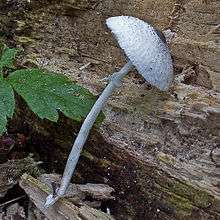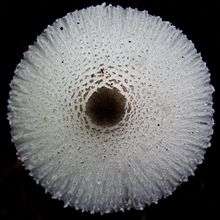Leucocoprinus brebissonii
| Leucocoprinus brebissonii | |
|---|---|
 | |
| Fruit body | |
 | |
| Cap detail | |
| Scientific classification | |
| Kingdom: | Fungi |
| Division: | Basidiomycota |
| Class: | Agaricomycetes |
| Order: | Agaricales |
| Family: | Agaricaceae |
| Genus: | Leucocoprinus |
| Species: | L. brebissonii |
| Binomial name | |
| Leucocoprinus brebissonii (Godey) Locq. (1943) | |
| Synonyms[1] | |
|
Lepiota brebissonii Godey (1874) | |
| Leucocoprinus brebissonii | |
|---|---|
|
| |
| gills on hymenium | |
|
cap is conical or flat | |
| hymenium is adnexed | |
| stipe has a ring | |
| spore print is white | |
| ecology is saprotrophic | |
| edibility: poisonous | |
Leucocoprinus brebissonii is a species of fungus in the Agaricaceae family. It was first described by Louis-Luc Godey in 1874 as Lepiota brebissonii,[2] and moved to Leucocoprinus by Marcel Locquin in 1943.[3] It is commonly called the skullcap dapperling due to its distinctive pattern on the cap. Until recently, this mushroom was only found in Europe but over the last few years has been identified in the Pacific Northwest.
Description
Leucocoprinus brebissonii is a small, delicate, mushroom with white and brittle flesh. Its cap (2 to 3 cm (0.8 to 1.2 in)) starts out conical expanding to a plane in age, with a dark brown/gray center that breaks up and radiates outwards on a white and deeply striated background. The white stem of L. brebissonii is long and slender (4.5 to 6 cm (1.8 to 2.4 in) by 3 to 6 mm (0.12 to 0.24 in)), equal or slightly clavate. It usually has a ring present, but due to its fragile nature sometimes it is rubbed or washed off. Its gills are crowded, white and narrowly attached to the stem, but occasionally detach in age. The spores (9 to 12 µm x 5.5 to 7 µm) are white and have a pronounced germ pore, elliptical or almond shape.[4][5]
Distribution and habitat
Leucocoprinus brebissonii is found in Europe and North America from summer to fall, where it grows in the soil in woods with deciduous trees.
Edibility
Leucocoprinus brebissonii is suspected to be poisonous.[5] Its taste and smell are nondescript.
References
- ↑ "Leucocoprinus brebissonii (Godey) Locq. 1943". MycoBank. International Mycological Association. Retrieved 2011-05-03.
- ↑ Gillet, Claude-Casimir (1878). Les Hyménomycètes ou Description de tous les Champignons qui Croissent en France (in French). 1. p. 64.
- ↑ Loquin, Marcel (1943). "Étude du développement des spores du genre Leucocoprinus Pat.". Bulletin mensuel de la Société Linnéenne de Lyon (in French). 12: 35–43.
- ↑ Trudell, Steve; Ammirati, Joe (2009). Mushrooms of the Pacific Northwest. Timber Press. p. 77. ISBN 978-0-88192-935-5.
- 1 2 Phillips, Roger. "Leucocoprinus brebissonii". Rogers Mushrooms. Retrieved 2011-05-03.
External links
- Leucocoprinus brebissonii in Index Fungorum
- Leucocoprinus brebissonii observations at Mushroom Observer
| Wikimedia Commons has media related to Leucocoprinus brebissonii. |